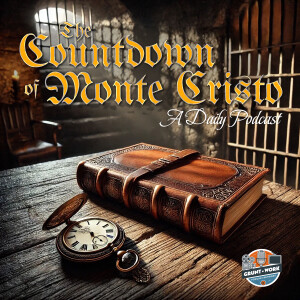
Sunday Apr 06, 2025
The Spectacle of Justice (The Count of Monte Cristo, Chapter 6)
📚 Summary:
As the conversation at the aristocratic gathering turns to law and order, the Marquise de Saint-Méran expresses her faith in Villefort’s ability to rid Marseilles of Bonapartist threats, believing that a king must rule with an iron hand. Villefort, however, acknowledges the limits of the law—it cannot prevent crime, only avenge it. The discussion takes a chilling turn when a young noblewoman naively expresses excitement at the idea of witnessing a trial, seeing it as a form of entertainment. Villefort indulges her curiosity with a grimly poetic description of courtroom drama, where the condemned do not return home like actors after a play but instead face real punishment, sometimes even execution.
✨ What Happens:
•The Marquise insists that the best way to maintain the Bourbon monarchy is to employ “inflexible agents” to crush conspiracies before they begin.
•Villefort acknowledges that the law is powerless until a crime has already taken place, emphasizing its reactive nature.
•A young noblewoman expresses a desire to witness a high-profile trial, viewing it as a form of amusement.
•Villefort darkly contrasts the experience of a courtroom with a stage play, explaining that real trials do not end with actors taking a bow, but with the convicted facing prison or death.
•He teases the possibility of letting her witness a trial if the opportunity arises.
💡 Thoughts & Reflections:
•Villefort’s idea of justice is not about prevention, but punishment. This foreshadows his later role in determining Edmond Dantès’ fate.
•The aristocratic view of justice is disturbingly detached. The noblewoman’s fascination with trials reflects how the upper class often sees legal proceedings as mere entertainment.
•Theatricality and spectacle—Villefort’s comparison of trials to plays highlights how justice in this era was as much about public perception as actual fairness.
📖 Historical & Cultural Context:
•The Holy Alliance & Political Repression: Formed in 1815, the Holy Alliance (Russia, Austria, and Prussia) sought to suppress revolutionary movements, aligning with Bourbon royalists who feared another rise of Napoleon.
•Post-Revolutionary Justice: The Bourbon monarchy’s legal system was focused more on punishing political enemies than ensuring fair trials, mirroring Villefort’s own pragmatic approach.
•Public Fascination with Trials: High-profile trials, much like public executions, were major social events in 19th-century France, reinforcing the blurred line between justice and spectacle.
🔮 Foreshadowing:
•Villefort’s role in Dantès’ imprisonment—his belief in reactive justice hints that he will justify severe punishment when it suits his ambitions.
•The theme of vengeance vs. justice—Villefort’s distinction between law and morality will later come into question as Dantès seeks retribution.
•The power of spectacle—this scene sets up how legal trials and public punishment will play a crucial role in the novel’s unfolding drama.
📢 Support the Show:
Enjoy breaking down The Count of Monte Cristo with us? Subscribe, share, and leave a review! Join the Grunt Work Podcast Network on Patreon at patreon.com/gruntworkpod for exclusive content and bonus discussions.
🔍 SEO Keywords: The Count of Monte Cristo podcast, Villefort justice, Alexandre Dumas legal drama, 19th-century French trials, Bourbon monarchy law, Monte Cristo political intrigue, classic literature analysis.